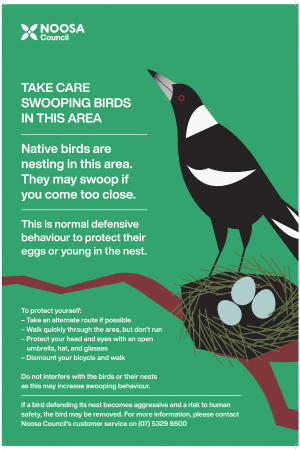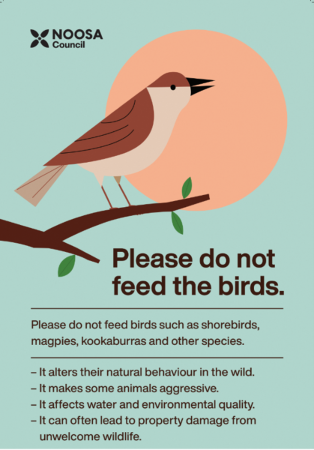Springtime can bring about increased swooping incidents, as birds become protective of their young. This page aims to provide you with important information on swooping birds within Noosa Shire, how to stay safe, and what to do if you encounter a swooping bird.
A number of different bird species can demonstrate swooping behaviour including magpies, butcher birds, honeyeater and plovers (masked lapwings). These birds can become territorial during the breeding season (usually spring) and may swoop to protect their young. This is normal behaviour, and occurs frequently across South East Queensland. In most circumstance, risks from swooping birds may be appropriately managed by taking a few simple precautions.
To help you stay safe during swooping bird season, please consider the following precautions:

If you encounter a swooping bird and feel threatened, report the incident to Noosa Shire Council’s Customer Service Centre. In some cases, Council may install warning signs in areas with known swooping activity. We aim to balance the safety of our residents with the protection of our local bird populations.
Native birds are protected under the Nature Conservation Act 1992, and it is illegal to harm them or interfere with their nests and eggs. In only extreme circumstances, where risks to the community cannot be appropriately mitigated by community awareness, education and signage, Council may choose to engage a licenced contractor to relocate the swooping bird, or the nest. Generally, Council does not support this approach due to the impacts on the welfare of the parent birds and their young.
Council does not manage birds on private property.
Residents who have swooping birds located on private property may choose to engage a licensed relocator for a fee - check your local telephone listings or the internet.
Australian birds need a varied and balanced diet of insects and nectar, seed or fruit to stay healthy. Many don’t realise that feeding wild birds can do more harm than good for our feathered friends – and if done incorrectly, can lead to serious problems.
Feeding birds can cause serious, long-term health problems including malnutrition and disease. Other negative impacts of bird feeding include;

Through education, Council discourages the feeding of birds and other wildlife on both public and private land for the above-mentioned reasons.
The feeding of wildlife (except within National Parks) is not regulated under the Nature Conservation Act 1992. Therefore, Council cannot regulate the activity.
As required, Council may install temporary signage on Council managed land such as parks and foreshores to educate the community members on the negative impacts of feeding birds.
Bird feeding on private land, which causes negative interactions between residents, remains a neighbourhood issue which requires resolution between landholders. Council cannot regulate the feeding of birds on private land.
If significant conflict cannot be reduced between landholders, and as a last resort, the Department of Justice and Attorney-General (JAG) provides a general neighbourhood dispute resolution service, including mediation, which could provide an alternative way of resolving the bird feeding issue with your neighbour. JAG can be contacted on (07) 3239 6277 or 1800 017 288.
Further information on the JAG dispute service, along with general information on the feeding of wildlife may found on the Queensland Government webpage - https://www.qld.gov.au/environment/plants-animals/animals/living-with/feeding-wildlife
